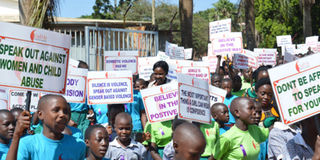Parents, pupils match against violence

Pupils from schools in Nakawa division and women matched against gender-based violence. COURTESY PHOTO.
As the world over celebrates the 16 Days of Activism against Gender- Based Violence, parents and primary school pupils of three different schools in Luzira, Butabika and Mutungo sub counties of Nakawa division gathered on a Saturday and matched through their communities, campaigning to end violence against women and girls.
The three-hour match processed from St James Primary School Biina, through Luzira, Kirombe Zone to Mutungo. Both parents and pupils shouted slogans against domestic violence on the way, while carrying plasters that called for gender equality, promotion of girl-child education, human rights among others and declaration of feminism.
Maureen Luwaga, a single mother of two, who are attending St Kizito Primary School, says she marched because she wanted to voice her grievances regarding the inequalities in provision of child education.
“I came from a home where only boys were granted a chance at education. My two younger sisters and I were not allowed an education beyond primary school and were married off at a tender age,” she says. “I’m here to let people know that it’s wrong. Education should be granted to both boys and girls.”
Viola Namubiru, a Primary Five Pupil at Murchison Bay Primary School, Luzira, says she was participating in the march because she wanted to express herself about child pregnancies.
“I want the community to know that it is bad for a girl such as myself to get pregnant while at school and that those men who lie to children and get them pregnant should stop,” she says.
Educating the girl-child
The march was organised by Girl Up, a local NGO that engages in empowering girls from less privileged families to stay in school by providing them with life skills, and education on child rights.
According to Monica Nyiraguhabwa, the executive director of Girl Up, the march was to draw the attention of the Luzira community to the 16 Days of Activism against Gender-based Violence campaign.
“This is a unique period during which the whole world is putting emphasis on what it means for each individual, male and female, as far as ending violence against girls and women, is concerned,’ says Nyiraguhabwa.
The National Strategy for Girls’ Education (2015-2019) highlights that sexual abuse is one of the biggest barriers to girls’ accessing and staying in school. Girls are more vulnerable to experiencing violence in school and in homes than boys (22.8 per cent girls compared to 8.8 per cent boys face sexual abuse) and these are even more serious for girls living with disabilities.
Margret Akello, the gender specialists at Plan International, emphasised the need for girl-child education. “Life is becoming more demanding and expensive, so if we don’t educate the girls who are the care takers in homes, we will not develop at the pace we want and this country will not grow,” she says.
During the 16-day campaign, activists around the world further raise awareness to the prevalence and devastating impact of gender violence, celebrate victories, exercise rights movements, challenge policy and practice that allow women to be empowered and demand for women violence.
It is important for all individuals to understand the implications of violence for their lives and the safety of all was emphasised on the day.
THE CAMPAIGN
The international campaign started on November 25, the International Day for the Elimination of Violence against Women and ends on the December 8, the Human Rights Day. The international campaign originated from the first Women’s Global Leadership Institute, coordinated by the Center for Women’s Global Leadership in 1991.
This year the campaign strongly emphasizes the need for sustainable financing for efforts to end violence against women and girls towards the fulfilment of the 2030 agenda for Sustainable Development.




